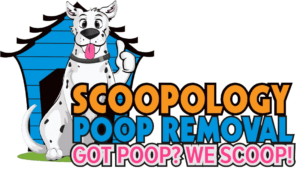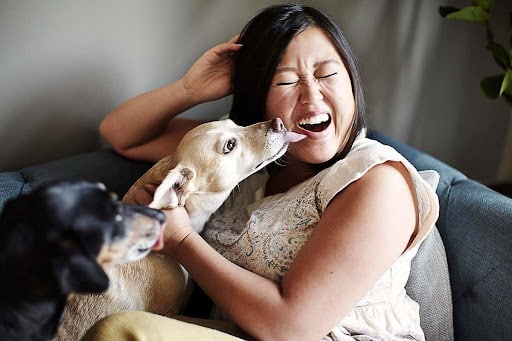
Dog Licking? 12 Reasons Why Dogs Lick
All dog owners know dogs are lickers – have you ever wondered why? Our scoopologists at Scoopology Poop Removal see dogs all day long licking their owners, other dogs, or a variety of objects. We even occasionally see dogs lick their own poop (see our blog post on why dogs eat their own poop for insight on that behavior). Surprisingly, dogs lick for a wide variety of reasons and often not why we might think.
“Researchers of wild canids — wolves, coyotes, foxes, and other wild dogs — report that puppies lick the face and muzzle of their mother when she returns from a hunt to her den — in order to get her to regurgitate for them,” notes Dr. Alexandra Horowitz, head of the Horowitz Dog Cognition Lab at Barnard College, Columbia University. Yuck! So, what we might interpret as affection might, in fact, be our dog encouraging us to throw up our lunch for them. In adult dogs, dog licking can be for a number of reasons.
Reasons Dogs and Puppies Lick
The following are twelve more reasons why a dog might lick themselves, people, other dogs, or objects:
1. Grooming. You may notice your pup licking their paws after spending time outside to remove dirt and debris. Dogs don’t groom themselves as extensively as cats do; however, self-bathing and grooming is still a normal behavior for dogs.
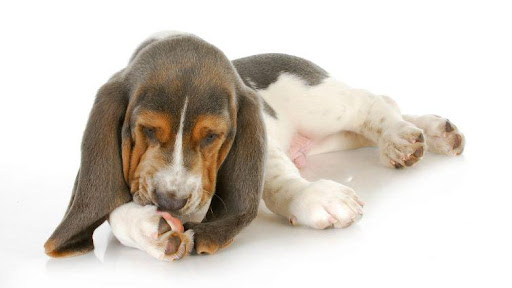
2. Itchy skin. A dog may lick due to allergies, skin parasites like fleas or mites, dry skin, skin infections, or anything else that causes itchiness. You may notice this combined with chewing behaviors.
3. Pain or discomfort. For example, a dog with arthritis may lick the skin over their achy hips or another joint that is bothering them. A dog with full anal glands may lick their rear end, in addition to scooting their bum on the ground. A pup may lick a skin wound. And a dog with a urinary tract infection may lick their genitals more than usual.
4. Exploration. Dogs explore the world with their mouths and their amazing sense of smell contributes to this. A dog may lick the kitchen floor, furniture, or their pet parent’s hands because they smell food particles that are undetectable to us.
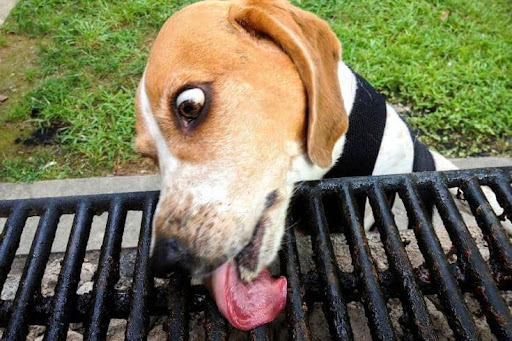
5. Hunger or thirst. If a dog is excessively licking their owner, that can also be their way of telling us they need something. Check if their food or water bowl needs to be refilled.
6. Behavioral causes. Licking may be a way to pass the time if a dog is bored, such as if they’re home alone for much of the day or if they don’t get enough physical or mental activity – see our blog on walking your dog if you think your dog may be lacking enough exercise. Licking is self-soothing and can make a pet feel better in the moment. Eventually, this can turn into a learned habit or compulsive behavior, so be on the lookout.
7. Cognitive dysfunction. Older dogs may develop this condition, which is similar to dementia in people. Excessive licking is one of many possible symptoms. Other common signs include disorientation, pacing, wandering around the home at night, potty accidents, sleeping more, and less interest in interacting and doing their usual activities.
8. Nausea. Dogs who are feeling nauseous may lick (themselves, others, or objects) more often due to increased saliva/drooling or trying to relieve the uncomfortable feeling or bad taste in their mouth.
9. Dental disease or another issue inside the mouth. A painful tooth or gum disease/gingivitis could cause a dog to lick more. It may be their way of trying to relieve the discomfort or deal with something that feels abnormal, such as a broken tooth.
10. They like the taste. A dog may lick their human companions simply because they like the taste of our skin. Dogs don’t sweat (other than a little from their paw pads), but humans have sweat glands over their whole bodies. This means our skin can have a bit of a salty taste. Dogs may also enjoy interesting-smelling lotions and odors of their owner’s previous meal.
11. Attention. If a pet’s licking is met with affection, praise, laughter, or other positive signs, they could learn that licking is a desirable behavior that results in attention. Even “negative” attention (such as saying “no”) could be a reward to pups who are bored or looking for interaction with their favorite person.
12. A sign of affection or submission. Since licking is a social behavior, it could be your dog is licking you to show their affection. “One theory is licking is a sign of submission,” according to certified applied animal behaviorist Dr. Mary Burch. This is a behavior seen often in wolves and other wild canids; licking, specifically on the mouth, can be seen as a sign of affection and respect. The idea is that dogs who are submissive will lick a more dominant member of the pack. It is also possible they could be showing you respect as their trusted “pack leader.” Dogs often show affection by licking, hence why many dog owners refer to licking as a dog kiss.
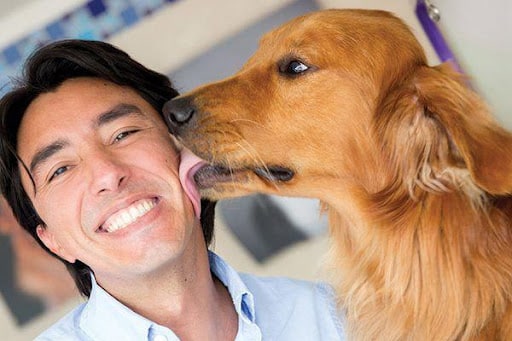
Tired of Your Pet Dog Licking? What To Do About Problem Licking
“One idea is to redirect your dog,” says Burch. “When they lick, switch up the activity. A good option is to choose a behavior that is incompatible with licking, such as using an interactive puzzle to get a treat. You can also have the dog engage in other behaviors such as ball play or trick training.” Repetition is the key to the redirect approach. Gradually reinforcing the lesson that you don’t want your dog to lick, without ever using negative reinforcement, takes time and patience.
While many people don’t think about it, dogs can experience psychological disorders. For your dog, licking may be a stress-relieving activity, similar to how some humans chew their fingernails or bounce their legs. If you find your dog constantly licks, you may not be offering them enough stimulation at home. Be sure to take your dog for regular walks, and give them things to do around the house. If your dog excessively licks walls, licks pillows, or licks themselves, they may be bored, stressed, anxious, or depressed.
Natural supplements are an excellent way to treat some causes of excessive itching without harmful medications or deterrents. Commonly used natural treatments include Vitamin E, Fish Oil, and Diatomaceous Earth. Remember that natural approaches usually take more time, because you are healing the underlying cause of the paw licking instead of only treating the symptoms.
In some cases, medication may be necessary. This can be beneficial if the cause of your dog’s itching and chewing is due to allergies, external parasites, or infection due to fungus, bacteria or yeast. Consult your veterinarian before experimenting with any potentially harmful medications.
While licking is not always an issue, excessive licking can be a major problem for you and your dog. Knowing the possible causes, problems, and ways to treat your dog’s issues can be a great way to solve the problem. Your dog will thank you for it when he no longer feels uncomfortable in his own skin, and the two of you can enjoy a happier, healthier life together. Once that happens an affectionate lick or two in celebration should be welcomed.
